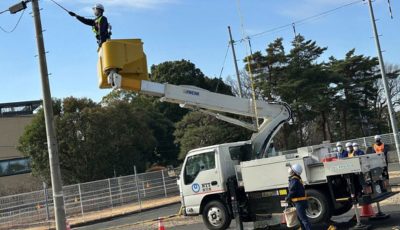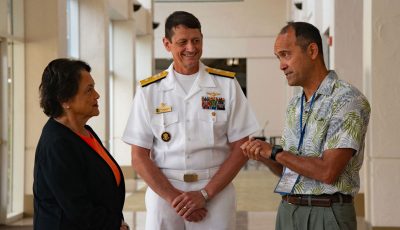RICK’S COLUMN
The Philippines and the United States
The United States and the Republic of the Philippines have a longstanding relationship founded on colonialism, power imbalances, violence, deception, and positive progress that remains at once a complex, divergent, and convergent environment. The bilateral relationship’s historical cornerstone is the Mutual Defense Treaty signed in 1951 and ratified by both national legislative bodies. Approximately 40% of the 10 million Filipinos residing outside the Philippines currently live and work throughout the American imperial landscape to include the Marianas.
Today’s Philippines military
The Philippines has its own marine corps, navy, air force and army with a total military personnel count equal to less than 10% of the total number of American military personnel worldwide. The Philippine military obtains much of its weaponry from South Korea while the United States provides some used military equipment and billions in foreign military sales. U.S. and Philippine intelligence communities maintain robust arrangements, underscoring the depth of this strategic relationship. Yet the Philippine military also trains with Russian military forces and Putin’s Pacific Fleet makes port calls in the Philippines.
The Philippine president
President Rodrigo Duterte was elected four years ago. Considered an iconoclast of sorts, Duterte is readily identified as a vociferous reader, former mayor, and previous longtime supporter of strongman Ferdinand Marcos. He is also accused as being the main sponsor of the extrajudicial killings of drug kingpins taking place throughout the archipelago.
Duterte is currently faced with the decision to possibly delay the termination for the third consecutive time of the American-Philippine Visiting Forces Agreement, or VFA, that was originally established in 1998. The VFA gives the United States control over its military personnel while in-country and outlines processes and procedures on how to handle a variety of situations that may arise.
Duterte is once again caught in a quagmire. On the one hand, Duterte thinks that the United States remains too deeply enmeshed in Philippine domestic affairs. He also interprets the VFA to be a document that was never intended to extend into perpetuity. Yet both the United States and the Philippines share mutual geopolitical interests such as sitting on several of the same multinational organizations to include the World Bank, the World Trade Organization, and the 10-nation Association of Southeast Asian Nations.
This common thread is contrasted with the United States being publicly critical of the extrajudicial killing spree brought against many of the country’s most dangerous drug dealers sponsored by Duterte’s administration. No one really knows how all these competing currents will alter, if at all, the tenor and import of the Mutual Defense Treaty, should a hot conflict erupt between the Philippines and China.
Geographical location continues to have enormous sway with regards to how Duterte views his role as president. Because of the Philippines’ proximity to China and its location bordering the South China Sea, the Philippine president must contend with China’s growing maritime control of the area that includes the penetration and imposition of China’s will throughout the Philippines’ Exclusive Economic Zone.
At the same time, Philippine trade relations with China is valued close to $50 billion, larger than the $30-billion trade value with the United States. China came to the aid of the Philippines by supplying COVID-19 vaccines that have gotten into the arms of tens of millions of Filipinos. China has provided domestic infrastructure funding to the Philippines and has refrained from openly criticizing the Philippine president over extrajudicial killings of drug dealers.
Military theater cooperation is still what this is all about
Military centric theater cooperation is the fundamental factor driving the current relationship between the Philippines and the United States, as evidenced by the several hundred bilateral military training events taking place each year. Non-military government to government partnerships that include U.S. Veterans Administration medical support for Americans living in-country, and extensive educational initiatives are relatively small in comparison to military related partnering.
How the Northern Marianas and Guam may be affected
Understanding the consequential nature of the VFA may be key to interpreting present day Philippine and American interests for our ancient Chamorro Pacific Islander civilization. If the VFA is wiped away, it will have real implications for America’s ability to train for war more effectively against China and it would signal to other Asian allies that China is becoming more and more influential.
One first order consequence of this is Guam and the Northern Marianas may see the Pentagon further beef up Air Force, Navy, and Marine Corps presence to train for war. Another consequence of a failed VFA would be that other island chains throughout the Micronesian region will be affected in an accelerated manner because of America’s enduring interest in building out a deeper and more widely distributed military operational footprint to dissuade, defend, and initiate kinetic operations against China.
Yet short of war, the longtime goodwill and economic relations between the Marianas and the Philippines will not be affected. The Chamorro people of our island chain and the Filipino populace have too many historical, cultural, religious, family ties, and social practices in common.
U.S. President Joe Biden reemphasized in his remarks given the other week to both chambers of Congress that America’s deep commitment toward ensuring U.S. military primacy in the broad Pacific Asia region is unwavering. Perhaps this is the most consequential political weather vane to gauge and follow in terms of American strategic intent and associated likelihoods for kill chain responses.



























